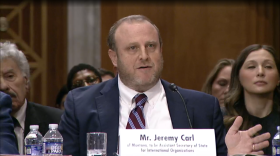A Republican-backed bill to create a “jungle primary” that would box-out third party candidates in the next U.S. Senate race in Montana has advanced.
Senate Bill 566 would create a primary system in which the top two candidates who win the most votes advance to the general election, regardless of party. Right now, each party has separate primaries and advances a winner.
Sen. Greg Hertz, a Republican from Polson, said the bill aims to ensure the most popular candidate wins for a high profile office.
“These are six year terms and to me, if we’re going to send someone to Washington, D.C., they should have the majority support of our voters,” Hertz said.
Hertz called his bill a test run as it includes a sunset date in 2025.

The bill would take effect ahead of the 2024 campaign, when U.S. Sen. Jon Tester is up for reelection. Tester is the last remaining statewide elected Democrat and his bid to hold office is expected to be highly competitive.
In 2012, Tester faced both a Republican and Libertarian candidate. Rep. Hertz highlighted that election saying Tester won with less than 50% of the vote.
Senate Minority Leader Pat Flowers pointed out that in 2022, U.S. Congressman Ryan Zinke also won with less than 50% of the vote due to a third-party candidate, but the bill won’t address U.S. House races. Flowers said it’s obvious the bill is targeted at Tester.
“Let’s not kid ourselves, this is just brazen partisanship targeting a single race. This isn’t fair, this isn’t what Montanans want, they don’t want one party rule,” Flowers said.
The Montana Libertarian Party said in a statement that they oppose the bill, calling it an unabashed attempt to eliminate Libertarian access to the ballot. Libertarians tend to pull votes from Republican candidates.
Senate Bill 566 has passed out of the Senate 27-23 and will now move onto the House for consideration.
-
Sen. Daines files for reelection, and raises eyebrows over his association with a controversial State Department nominee. Montana's incumbent congressmen stand by Trump's economic policies, but do voters? Will he or won't he? Former UM President Seth Bodnar has yet to announce his political ambitions.
-
The U.S. Supreme Court overturned many of the Trump administration’s tariffs on foreign imports. The ruling is welcome news for Montana agriculture producers, who have been facing rising costs and shrinking markets.
-
Although some 2026 candidates have been campaigning for months, the official registration period opened this week. Political hopefuls have two weeks to turn in their paperwork.
-
New analysis from Montana legislative staff shows the state’s share of school budgets has gone up in dollar amount over the last two decades. But due to inflation, the value of that money has stayed almost exactly the same as it was in 2008.
-
A Bozeman-based candidate nominated for a top U.S. Department of State job is facing bipartisan backlash after a congressional hearing last week. Members of the Senate Foreign Relations Committee questioned Jeremy Carl about past statements they called racist and anti-Semitic.





![Farmer Justin Miller [right] takes over seeding duties from his colleague on a farm near Gildford, MT on Sept. 12, 2025. Miller is seeding next year’s winter wheat, despite historically low commodity prices.](https://npr.brightspotcdn.com/dims4/default/515e8d5/2147483647/strip/true/crop/6000x3343+0+329/resize/280x156!/quality/90/?url=http%3A%2F%2Fnpr-brightspot.s3.amazonaws.com%2F29%2F48%2F86b24d354bc6b846dc04ad224484%2Fwheat-seeding.JPG)



